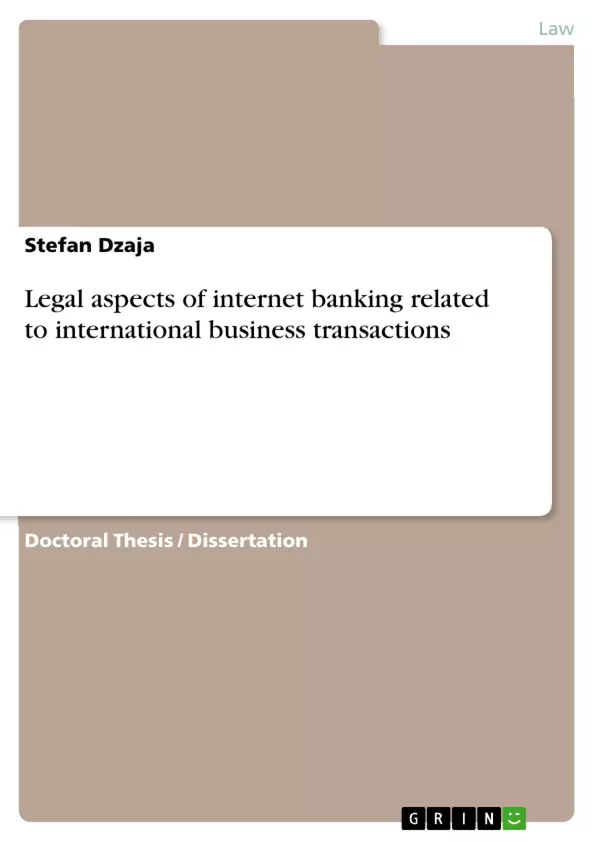This paper focuses upon legal issues arising in the field of electronic or Internet banking. The overview of previous developments in this field and of types of e-banks will be given. It analyses existing and potential problems mainly connected with cross-border services. The issue of data protection, the right to provide services and the advertisement of e-banking services will be especially examined. The paper will evaluate current regulation and it will be shown, that there are either lacunae in such legislation, in the alternative, several important issues are left unanswered, possibly severely hindering the further progress of Internet banking. This dissertation suggests that further developing of both international and domestic legislation is crucial for banks to be able to make use of the possibilities offered by the Internet.
Table of Contents
- Chapter 1 Introduction
- Problem statement
- Aim and method of research
- Conceptualisation
- Banking group
- Branch of a bank
- Data
- Electronic banking
- Electronic money
- Internet banking
- Money laundering
- Profiling
- Transaction
- Structure of the Thesis
- Chapter 2 Internet banking: changing the face of financial services
- Introduction
- Virtual banks: future of banking
- Main risks for electronic banking
- Chapter 3 Jurisdiction: the cross-border nature of the Internet
- Introduction to the Jurisdiction
- The problem of targeting the Internet bank customers
- Supervision of e-banking: need for international cooperation
- Chapter 4 Internet banking: selected issues
- Introduction
- Data protection and consumer privacy
- The importance of privacy: risks
- Regulation in the United Kingdom
- Regulation in South Africa
- Consumer profiling
- Providing services
- Regulation in the United Kingdom
- Regulation in South Africa
- Advertising internet banking services
- Regulation in the United Kingdom
- Regulation in South Africa
Objectives and Key Themes
This study delves into the legal issues arising in the field of electronic or Internet banking, focusing on the potential and challenges of this evolving sector. It analyzes the development of e-banks, the legal complexities of cross-border services, and the need for robust regulation.
- Legal implications of Internet banking
- Cross-border nature of online financial services
- Data protection and consumer privacy in the context of Internet banking
- Regulation of e-banking services in various jurisdictions
- The impact of Internet banking on traditional banking models
Chapter Summaries
Chapter 1 provides an introduction to the problem statement, outlining the rapid growth of the internet and the relatively slow development of legislation in this field. It defines key concepts and highlights the importance of a comprehensive legal framework to address the unique challenges posed by internet banking.
Chapter 2 discusses the transformation of financial services brought about by Internet banking, exploring the rise of virtual banks and the inherent risks associated with electronic banking.
Chapter 3 delves into the complexities of jurisdiction in the context of internet banking, highlighting the challenges of targeting customers across borders and the need for international cooperation in regulating e-banking services.
Chapter 4 examines selected issues related to internet banking, including data protection, consumer privacy, providing services, and advertising.
Keywords
Internet banking, electronic banking, cross-border transactions, jurisdiction, data protection, consumer privacy, regulation, financial services, virtual banks, legal framework, e-commerce, digital economy.
Frequently Asked Questions
What are the main legal challenges of internet banking?
Key challenges include jurisdiction in cross-border transactions, data protection, consumer privacy, and the lack of comprehensive international legislation.
How does jurisdiction affect online financial services?
The cross-border nature of the internet makes it difficult to determine which country's laws apply when a bank targets customers in different regions, requiring international cooperation.
What is the importance of data protection in e-banking?
Data protection is crucial to safeguard consumer privacy against risks like profiling and identity theft, which are more prevalent in digital environments.
Which countries are specifically compared in this study?
The paper evaluates and compares the regulations for internet banking in the United Kingdom and South Africa.
What are "Virtual Banks"?
Virtual banks are financial institutions that operate primarily or exclusively online without traditional physical branches, representing the future of banking services.
Why is further legislative development necessary?
Current legislation often has gaps (lacunae) that hinder the progress of internet banking. Domestic and international laws must evolve to keep up with technological advancements.
- Citation du texte
- Stefan Dzaja (Auteur), 2005, Legal aspects of internet banking related to international business transactions, Munich, GRIN Verlag, https://www.grin.com/document/47996



